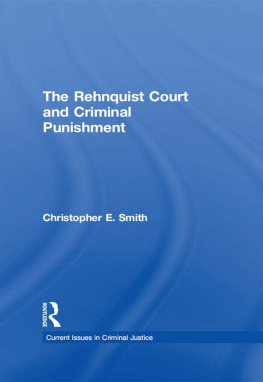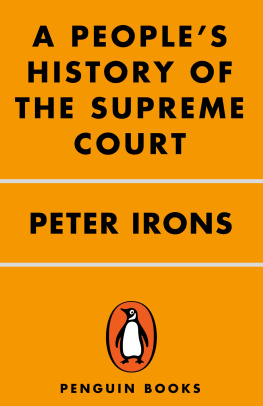One pleasure of writing this book was getting to work with old friends and valued colleagues. Another is the opportunity to recognize their contributions in print. Some come readily to mindmy classmate and contemporary Art Seder (we were born on the same day), who clerked for Fred Vinson; my former law partner, the late Ed Rothschild, who counseled me during my confirmation hearings; Judge Tim Dyk of the United States Court of Appeals for the Federal Circuit and Frank Beytagh, former Dean of the Moritz College of Law at the Ohio State University, both former clerks for Earl Warren; and countless present and former employees of the Supreme Court. Bill Suter, the incomparable Clerk of the Court, for example, is not just the source of statistical data but also the man who measured the distance between the lectern and the chief justice for me. And Catherine Fitts, the curator, verified the history of the statue of John Marshall. At the Library of Congress, Daun Van Ee has facilitated important research for the book. As was true with respect to the many judicial opinions I have written over the years, I have received invaluable help from my law clerk Sam Erman throughout my work on this book; from his successor, Dina Mishra, with its conclusion; and from library assistants Linda Corbelli, Jill Duffy, Patricia Evans, Michelle Humphries, Melissa Kreiling, Linda Maslow, Catherine Romano, Sara Sonet, and Kate Wilko. I am grateful to Peter Edwards, my aide to chambers, for his ongoing logistical efforts. My agent, Peter Bernstein; my editor, Geoff Shandler; and Geoffs staff at Little, Brown and Company suggested important improvements and deserve praise for helping shepherd this project to completion. With the help of Steve Petteway, the Court photographer, the pictures in the volume were selected by my secretary, Janice Harley, and by my beautiful dietician, who happens to be married to me.
CONSTITUTION OF THE UNITED STATES
W E THE P EOPLE of the United States, in Order to form a more perfect Union, establish Justice, insure domestic Tranquility, provide for the common defence, promote the general Welfare, and secure the Blessings of Liberty to ourselves and our Posterity, do ordain and establish this Constitution for the United States of America.
A RTICLE I.
S ECTION 1. All legislative Powers herein granted shall be vested in a Congress of the United States, which shall consist of a Senate and House of Representatives.
S ECTION 2. 1The House of Representatives shall be composed of Members chosen every second Year by the People of the several States, and the Electors in each State shall have the Qualifications requisite for Electors of the most numerous Branch of the State Legislature.
2No Person shall be a Representative who shall not have attained to the Age of twenty five Years, and been seven Years a Citizen of the United States, and who shall not, when elected, be an Inhabitant of that State in which he shall be chosen.
3Representatives and direct Taxes shall be apportioned among the several States which may be included within this Union, according to their respective Numbers, which shall be The actual Enumeration shall be made within three Years after the first Meeting of the Congress of the United States, and within every subsequent Term of ten Years, in such Manner as they shall by Law direct. The Number of Representatives shall not exceed one for every thirty Thousand, but each State shall have at Least one Representative; and until such enumeration shall be made, the State of New Hampshire shall be entitled to chuse three, Massachusetts eight, Rhode Island and Providence Plantations one, Connecticut five, New York six, New Jersey four, Pennsylvania eight, Delaware one, Maryland six, Virginia ten, North Carolina five, South Carolina five, and Georgia three.
4 When vacancies happen in the Representation from any State, the Executive Authority thereof shall issue Writs of Election to fill such Vacancies.
5 The House of Representatives shall chuse their Speaker and other Officers; and shall have the sole Power of Impeachment.
S ECTION 3. 1 The Senate of the United States shall be composed of two Senators from each State, chosen by the Legislature thereof for six Years; and each Senator shall have one Vote.
2Immediately after they shall be assembled in Consequence of the first Election, they shall be divided as equally as may be into three Classes. The Seats of the Senators of the first Class shall be vacated at the Expiration of the second Year, of the second
3 No Person shall be a Senator who shall not have attained to the Age of thirty Years, and been nine Years a Citizen of the United States, and who shall not, when elected, be an Inhabitant of that State for which he shall be chosen.
4 The Vice President of the United States shall be President of the Senate, but shall have no Vote, unless they be equally divided.
5 The Senate shall chuse their other Officers, and also a President pro tempore, in the Absence of the Vice President, or when he shall exercise the Office of President of the United States.
6 The Senate shall have the sole Power to try all Impeachments. When sitting for that Purpose, they shall be on Oath or Affirmation. When the President of the United States is tried, the Chief Justice shall preside: And no Person shall be convicted without the Concurrence of two thirds of the Members present.
7 Judgment in Cases of Impeachment shall not extend further than to removal from Office, and disqualification to hold and enjoy any Office of honor, Trust or Profit under the United States: but the Party convicted shall nevertheless be liable and subject to Indictment, Trial, Judgment and Punishment, according to Law.
S ECTION 4. 1 The Times, Places and Manner of holding Elections for Senators and Representatives, shall be prescribed in each State by the Legislature thereof; but the Congress may at any time by Law make or alter such Regulations, except as to the Places of chusing Senators.
2 The Congress shall assemble at least once in every Year and such Meeting shall be on the first Monday in December, unless they shall by Law appoint a different Day.
S ECTION 5. 1 Each House shall be the Judge of the Elections, Returns and Qualifications of its own Members, and a Majority of each shall constitute a Quorum to do Business; but a smaller Number may adjourn from day to day, and may be authorized to compel the Attendance of absent Members, in such Manner, and under such Penalties as each House may provide.
2 Each House may determine the Rules of its Proceedings, punish its Members for disorderly Behavior, and, with the Concurrence of two thirds, expel a Member.
3 Each House shall keep a Journal of its Proceedings, and from time to time publish the same, excepting such Parts as may in their Judgment require Secrecy; and the Yeas and Nays of the Members of either House on any question shall, at the Desire of one fifth of those Present, be entered on the Journal.
4 Neither House, during the Session of Congress, shall, without the Consent of the other, adjourn for more than three days, nor to any other Place than that in which the two Houses shall be sitting.
S ECTION 6. 1 The Senators and Representatives shall receive a Compensation for their Services, to be ascertained by Law, and paid out of the Treasury of the United States.from Arrest during their Attendance at the Session of their respective Houses, and in going to and returning from the same; and for any Speech or Debate in either House, they shall not be questioned in any other Place.
2 No Senator or Representative shall, during the Time for which he was elected, be appointed to any civil Office under the Authority of the United States, which shall have been created, or the Emoluments whereof shall have been encreased during such time; and no Person holding any Office under the United States, shall be a Member of either House during his Continuance in Office.



